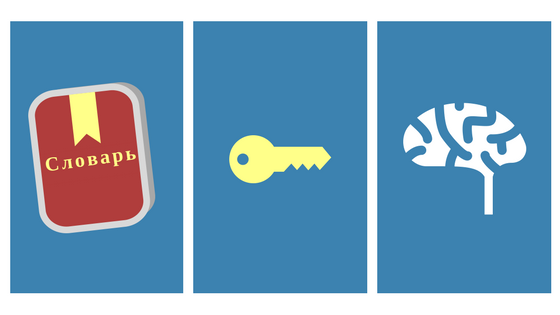Today, I want to share with you some methods to learn new foreign words. They help me, and, I hope, will help you to broaden your vocabulary too. These techniques you can use in your self-study, even if you have no teacher.

It is better to make some breaks between these exercises. This way you will check, which words you already remember well, and which words you need to revise. Moreover, it trains your long-term memory. And you want to remember words for a long time, don’t you?
1. Group the words
It is easier to learn words when they have something in common. It can be the same topic, word and its opposites, word and its synonyms, or some other logic. Grouping the words helps to memorize them, as you link the words not only to its meaning but to some general category too. So, if you accidentally forget, let’s say, what ‘машина’ is, you still may recall that it relates to transport, and then to guess its meaning. Learning synonyms together helps to get the nuances of meanings.
Moreover, it will be easier to organize the following regular practice for these words. It is difficult to find a context to practice the words, that have nothing in common.
2. Find associations
Probably, it is the most popular approach to learn new words. You need to find a word or phrase in your mother tongue (or another language you speak), that will sound similar to the word you learn. It is better if you can logically explain or make this association visual to better link it to the word.
Here are some examples of English associations to Russian character adjectives:
- че́стный – honest – chess knee (Suppose, honest people like to play chess on their knees and to tell the truth.);
- хи́трый – cunning – Heathrow (Cunning people work in the airports, just think of that high prices!);
- лени́вый – lazy – Lynn и Вы are two lazy people;
- зло́й – angry, evil – z–law is the law of bad people;
- осторо́жный – careful, prudent – oyster rouge knee (Just imagine, how carefully it rouges its knee!).
3. Design collocations and sentences
This technique will help you to figure out, how a new word works in the context, and to repeat it several times as well (which also helps to memorize).
Think of as many collocations and sentences with a new word, as you can (or until you get bored). If you have any doubts in your examples, find examples in a textbook, in a dictionary, or in Corpus.
For instance, if you learn the word ‘брать’ (to take), what patterns can be here?
- Брать газету со стола, брать кредит в банке, брать на работу, брать с собой…
- Я беру книгу в библиотеке. Он берёт кредит. Почему вы не берёте с собой детей в отпуск? Никто не берёт Ивана на работу, хотя он очень хороший специалист.
Can you think of more?
4. Model the situations, where you may need that word
This way you not only repeat a new word for several times but also prepare to use it at the right moment. Let’s take the word ‘пельмени’ (dumplings). When may you need it?
- In a supermarket: «Извините, пожалуйста, у вас есть пельмени?»
- In a restaurant: «Мне, пожалуйста, пельмени со сметаной и чай».
- Visiting friends: «Какие вкусные пельмени! Вы сами их лепили?»
- Talking to a friend: «Поделись, пожалуйста, твоим рецептом пельменей!»
And so on…
5. Describe pictures and photos
Find on the Internet some suitable images and describe them.
For instance, you learn furniture vocabulary. Choose some interior photo. What do you see there?
Здесь есть жёлтый мягкий диван, жёлтое кресло, красивая картина, интересная лампа, современный телевизор, большой книжный шкаф. На диване сидит папа и читает газету…
6. Take an interview
You have just learned that many Russian words to talk about investments! Now you have to interview a famous Russian investment consultant! Prepare a comprehensive list of questions to ask him. Don’t miss such a rare opportunity to learn all the secrets of successful investor!
And now,..
you are investment consultant from Russia. Answer the journalist’s questions!
7. Write a story
This technique works even with the words, which have nothing in common. For example, you read a book and have 20 different new words. Write a story with them. But there are some rules:
- there should be at least one new word in each sentence,
- you need to use all the words from the list,
- you need to logically connect the sentences (you write a story, not just examples).
Most probably, it will be something crazy. The crazier the story is, the more fun you have.
There is another (more advanced) variation, where you can use only words from the list and auxiliary words. Unfortunately, it is possible not for any random vocabulary list.
8. Revise words, when meeting them in life
Now, if you don’t want to forget all these words, you need to revise them regularly. Unfortunately, we forget foreign languages without practice. So, in your daily life, when you meet something, that you already can say about in Russian, try immediately to think, how you would say it in Russian.
You can exercise this way right from the beginning. For example, you have learned many city words like ‘музей,’ ‘банк,’ ‘университет,’ ‘стадион,’ ‘рынок,’ etc. You see all this stuff every day, don’t you? Use it to revise words! Next time, when you see a pharmacy on your way to work, recall ‘аптека.’ And when you see a shop, recall ‘магазин’…
9. If you regularly forget a word
I had such a problem with the English word ‘obviously.’ I remembered well the word itself, but always forgot its meaning, its Russian translation. Every time I saw it in texts, I was sure to learn it before, but I didn’t remember it. So, I decided to recall ‘obviously’ and its translation several times a day. No translation came to my mind for the first time, so I had to check dictionary again and again for two or three days. Now I still remember it. Obviously – очевидно.
Do you also have such a word you never remember? Try this approach, it works. Do you think, you forget to recall your ‘obviously’ during a day? Just set up the reminders on your phone!
That is all I have for now. And what techniques do you use to learn new foreign words?


Leave a Reply